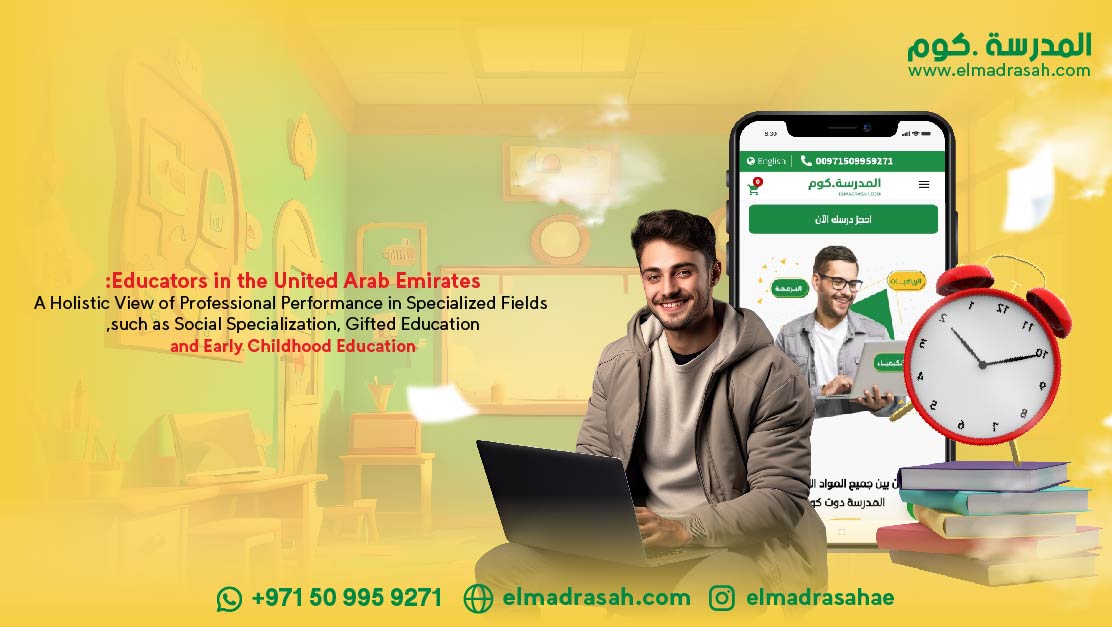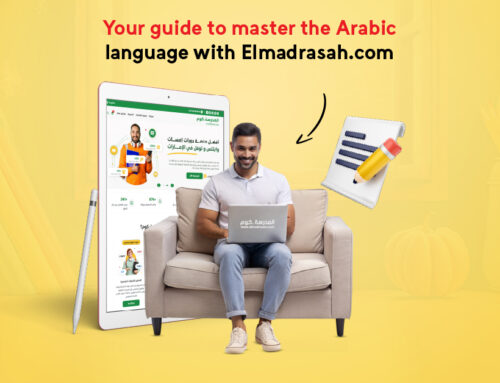
Educators in the United Arab Emirates play a vital role in developing society and shaping promising generations through effective professional performance in the fields of education. One of the most important of these areas is the social major, where they excel in building positive relationships with students and the community. Teaching the gifted also plays a role in meeting the needs of students with distinctive skills. In early childhood education, effective professional performance requires providing the best care and education for children, and the article examines the performance of teachers in these disciplines in greater detail.
Educators in the United Arab Emirates
The role of teachers in the UAE embodies a fundamental pillar for achieving educational and social development. Enhancing their professional performance in the specializations of social work, teaching the gifted, and early childhood education contributes greatly to building a bright future for future generations in this prosperous nation.
Professional performance in social work specializations
The role of teachers in social work disciplines requires a deep understanding of social and cultural challenges.
Social worker standards in the United Arab Emirates have been developed to be compatible with the aspirations of the UAE’s future vision. The performance standards for Educators in the United Arab Emirates as social workers are as follows:
Standard 1: Knowledge and practice of values and ethics
Social workers demonstrate that social work values are embedded in their practice, that they uphold their ethical responsibilities and act appropriately when faced with ethical problems, issues and dilemmas. Social workers actively promote and support the social work profession, and act with integrity. The most important of these standards are:
- Respecting and promoting the values of the United Arab Emirates.
- Respect and promote the heritage and culture of the United Arab Emirates, including Islamic values and laws.
- Demonstrate, promote and implement the national vision and direction in social work programmes.
- Demonstrate awareness of the ethical and legal standards of social work as they apply to professional service, training and research.
- Demonstrate all aspects of the requirements for ethical and appropriate behavior in the provision of social work services.
- Representing the social work profession with integrity and professionalism.
Standard 2: Culturally responsive and inclusive practice
Social workers have sufficient understanding and knowledge of cultural diversity in order to work in an inclusive and cross-cultural manner within the education sector. Educators in the United Arab Emirates must be social workers
Show appreciation for their cultural identities and the identities of others.
- Social workers use a wide range of skills and techniques that demonstrate an understanding and respect for the importance of culture in practice, policy and research.
- Social workers must possess and continue to develop specialized knowledge and understanding that includes the history, traditions, values, family systems, race, ethnicity, tribal groups, religion, spirituality, social class, and mental or physical abilities of various students, families, and cultural groups in the community.
- Work respectfully and inclusively with cultural difference and diversity within the education sector.
- Integrating social justice concepts as part of social work service delivery within the educational sector.
Standard 4: Professional knowledge and accountability
Social workers possess and obtain the knowledge necessary for effective practice. Social workers must continually:
- By equipping themselves with a body of knowledge and evidence that draws on academic literature, empirical research, the Ministry of Education and national legislation related to their field of activity in order to practice the profession safely and professionally within an educational context.
- Maintain up-to-date evidence-based knowledge of social work practice.
- Recognizing the role of research and evaluation in obtaining new knowledge and generating it for practice within educational settings.
- Understand and articulate the application of theories, knowledge bases and resources to guide practice.
Standard 5: Professional practice in social work
Educators in the United Arab Emirates Social Workers work and support individuals, students, families of students, carers, groups and communities through difficult times and ensure that vulnerable clients, including children and adults, are protected from harm.
- Their role is to help improve outcomes in the lives of students and their families.
- They maintain professional relationships and act as mentors and advocates.
- Sometimes they need to use their professional judgment to make difficult decisions.
- They also work within the framework of relevant legislation and procedures.
- Social workers conduct interviews and assessments, keep accurate records, prepare reports, liaise and make referrals to other agencies, participate in interdisciplinary teams, and provide professional training and supervision.
- Involving students and their families in social work practice.
Standard 6: Professional development and growth
Social workers recognize the importance of continually increasing their knowledge and skills and are committed to and actively participate in the continuing education process. Social workers demonstrate their commitment to continuous learning through ongoing professional development and supervision. Through their social work, they develop self-awareness which becomes the basis of professional development and is supported by professional supervision and organizational management.
The performance of teachers in the UAE in teaching the gifted education
Teaching the gifted requires Educators in the United Arab Emirates to have an exceptional vision to discover different talents. They must provide a learning environment that stimulates challenge and creativity. Despite the challenges, supporting teachers and providing training opportunities contribute to enhancing their professional performance, as these standards demonstrate:
Standard 1: Professional and ethical behavior
Teachers of gifted and talented students fulfill professional roles and responsibilities and understand the legal and ethical issues relevant to the education of these students.
- Talented and talented teachers demonstrate their commitment to the UAE’s heritage and cultural values; Personal and professional ethics, which are integrity, respect, justice and commitment.
- Gifted and talented teachers collaborate and communicate professionally with colleagues to promote and support learning.
- Teachers create an environment in which fair treatment, equity and respect for diversity are designed, taught and practiced by all, and take steps to ensure access to quality learning opportunities for all students.
- Support, build and maintain sensitive and responsive relationships with each learner.
Standard 2: Professional knowledge in teaching the gifted and talented
Talented Educators in the United Arab Emirates understand how the philosophical, historical, and legal foundations of their field help develop effective practice. They draw on this knowledge to organize and design appropriate practices and to ensure that students’ rights are protected and respected. They use their knowledge of human development and learning and their skills as close observers of students to help develop students’ knowledge, abilities, skills, interests, aspirations and values, by:
- Developing knowledge in the field of gifted education.
- Demonstrate basic knowledge of the historical, legal, and conceptual foundations of gifted education.
- Developing knowledge in identifying the educational needs of learners.
- Identify the physical, social, and intellectual development and characteristics of gifted and talented learners.
Standard 3: Professional practice in teaching the gifted and talented
UAE Gifted and Talented teachers create classroom environments that encourage students to express their gifts and talents. They collect multiple types of assessment information so that all students have equal access to the identification process.
- Teachers apply valid and reliable assessment practices to reduce bias and select and use appropriate assessment tools to identify, diagnose and evaluate students with diverse backgrounds.
- They also differentiate their curriculum and instruction by using data from pre- and post-assessments, performance-based assessments, product-based assessments, and other assessments that measure student growth.
- Employing multiple and continuous assessment to enrich progress in cognitive, social, emotional, and psychosocial areas and abilities.
- Develop meaningful and challenging educational activities that address the distinctive characteristics and needs of learners and develop their cognitive and emotional development and psychosocial skills.
- Build a continuum of K-12 lessons and coordinate gifted, general, special, and relevant professional educators, including out-of-school learning specialists and advocates.
Standard 4: Participation in professional development, growth and collaboration
Educators in the United Arab Emirates frequently assess their professional learning needs against standards, develop and monitor their professional learning plans, systematically engage in training and learning to meet identified needs, and align outcomes with teacher performance and student curriculum standards. Gifted and talented teachers are effective teachers of the gifted by implementing professional learning programs in gifted education.
- Teachers are trained to recognize giftedness and differentiate the curriculum appropriately, especially in inclusive classes.
- Teachers in professional learning are also engaged in daily teaching practice, purposefully guided by the needs of the teacher, and driven by the teacher’s conscious and reflective approach to learning.
- Students with giftedness spend much of their time within general education classrooms, so general education teachers receive education and training that enables them to recognize characteristics of giftedness in diverse populations, and understand the referral and identification process in a school or district.
- Identify your professional strengths and opportunities for professional growth and practice.
- Measuring the impact of professional development on learner achievement.
- Evaluating the impact of professional development activities on teaching practices.
Standard 5: Management, governance and leadership
Talented Educators in the United Arab Emirates provide leadership to formulate goals, set and meet high professional expectations, advocate for effective policies and evidence-based practices, and create positive work environments.
- Gifted teachers support effective leadership and management that contribute to good environments for children’s learning and development.
- They engage in administrative tasks that include well-documented policies and procedures, well-kept records, clear directions, and organizational governance of a shared vision, goals, and values.
- Gifted teachers contribute to creating a culture in which school environments work for learners and function as a learning community based on best practices.
The performance of teachers in the UAE in early childhood education
Child rearing in the early stages plays a crucial role in building a strong foundation for all-round development. Teachers in this field must provide positive learning experiences and promote social interaction. The UAE Early Childhood Educator Standards have been developed, reviewed and validated to ensure the capacity of professionals, at various career stages, to enable them to achieve a high level of professionalism within an educational context.
Standard 1: Professional and ethical behavior
Early childhood teachers demonstrate their commitment to the UAE’s heritage and cultural values; personal and professional ethics, which are integrity, respect, justice and commitment.
They foster relationships with responsive and respectful students and enhance children’s sense of safety and belonging. Relationships of this kind free early childhood students to explore the environment and engage in play and learning.
- Early childhood educators collaborate and communicate professionally with stakeholders to promote and support learning.
- Early childhood educators facilitate daily experiences that support and enhance the physical, linguistic, emotional, cognitive, social, and creative development and behavior of each student using appropriate techniques and tools.
- Identify all stages and areas of child development and children’s behaviors.
Standard 3: Professional practice in early education
Educators in the United Arab Emirates for early childhood promote and support children’s holistic learning and development.
- Early childhood educators implement pedagogical approaches and develop programs that meet the developmental needs of students within their settings.
- They work to establish trust and relationships with students and create learning and development portfolios to document each student’s development.
- They also work collaboratively with the families of the students in their care.
- Apply appropriate educational methods and programs.
- Developing and implementing appropriate curricula and educational programs for kindergartens (KG1 to KG2).
- Develop meaningful rapport and relationships with early childhood students.
Standard 4: Professional practice in student safety, health, hygiene, and nutrition
Early Childhood Educators in the United Arab Emirates develop and maintain settings and environments that reduce risks, protect students from harm, and promote the health, well-being, and safety of all students.
- They support students’ rights to receive a quality education in an environment that provides for their physical and psychological well-being and supports the increasing competence, confidence and independence of each student.
- They complete a variety of health and safety procedures and adhere to quality standards and current health and safety-related laws and regulations.
Standard 5: Professional practice in directing student behavior
Early childhood educators help guide student behavior in a positive way by modeling appropriate pro-social behaviors and applying a variety of strategies.
- They work together to ensure a team approach, where each student’s strengths and interests are harnessed.
- Show mutual support and respect. As such, a positive mentoring approach allows the student to promote and develop healthy self-esteem, self-control, social awareness and responsibility.
- Developing appropriate language and communication skills for each student.
- Teaching and developing problem-solving skills among early childhood students.
- Teaching and developing conflict resolution methods for early childhood students.
Standard 6: Collaboration with families and communities
Early Childhood Educators in the United Arab Emirates facilitate and maintain collaborative relationships with each student’s family to enhance student development in all settings. These relationships are sensitive to family composition, language, and culture. To support optimal learning and development of students
- Early childhood educators create relationships with families based on mutual trust and respect.
- Involving families in their children’s educational development, and encouraging families to participate fully in their children’s learning programs.
- They also develop community partnerships based on active communication, consultation and collaboration.
- Supporting the inclusion of early childhood, transitional development and learning students.
Standard 7: Personal and professional development
Early childhood Educators in the United Arab Emirates take responsibility for professional growth by reflecting on performance, identifying development needs, planning and participating in professional development, and evaluating impact on teaching and learning.
- They engage in learning opportunities to improve knowledge and skills on a personal and professional level.
- They test their professional knowledge and expertise in real contexts to develop their approach to teaching and learning through continuous reflection on practice.
- They demonstrate the ability to identify their own learning needs and self-plan by engaging in independent learning and ongoing professional development training.
- They identify and engage in knowledge sharing opportunities with colleagues and others Develop an individual professional development plan that aligns with school and national priorities.
- Evaluate the impact of professional development activities on student achievement.
Standard 8: Management, governance and leadership
Emirates early childhood educators support effective leadership and management that contribute to providing good environments for student learning and development.
- They engage in administrative tasks that include well-documented policies and procedures, well-maintained records, clear directions, and organizational governance of a shared vision, goals, and values.
- Early childhood educators contribute to creating a culture in which early childhood school environments function and function as a learning community, synonymous with international best practice.
- Understand roles and responsibilities within the school’s early childhood education system.
- Promote effective leadership, positive organizational culture, and professional learning community.
- Support the development of professionals in early childhood education schools.
Elmadrasah.com courses to qualify for passing exams for educational professions
Elmadrasah.com platform is interested in everything that contributes to enhancing the educational process, whether for Educators in the United Arab Emirates or students. It provides specialized courses in qualifying teachers for exams for educational professions on the professional and administrative side in all specializations.bThe advantages of these courses are:
- Online courses, which provides flexibility in choosing the appropriate time and place to receive the courses.
- Live individual sessions to increase achievement and communication between trainer and teacher.
- A wide variety of courses from the beginning of the qualification courses for the teaching professions license test in basic education to secondary education.
- Elmadrasah.com courses are also distinguished by the fact that they are conducted by highly experienced and competent trainers.
- In addition to the ease of booking and starting directly one day after booking.
So, teachers in the Emirates, do not hesitate to use elmadrasah.com courses for further progress and effective professional development.















